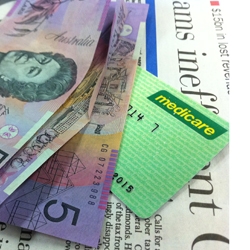
Co-payments for GP visits could end up far higher than the mandatory $7, doctors warned, as bulk-billing clinics recoup costs caused by having to charge patients for the first time.
And non-concessional patients already used to paying more could see their fees hiked even higher, as doctors seek to make up for the losses incurred by waiving the co-payment in compassionate cases.
Bulk-billing rates in some areas, including western Sydney, are as high as 99 per cent and many clinics do not have existing facilities to collect cash or take card payments.
University of Western Sydney’s medical school Professor Jennifer Reath said there was a danger of smaller GPs moving out of areas where bulk-billing rates were high as a result of the co-payment requirement.
Western Sydney contains some of the most marginal electorates in the country, which will provide a potentially thorny issue come election time.
“This will further exacerbate the difficulties people in these areas will face in accessing healthcare,” said professor Reath, who attended the protests in Sydney in Sunday.
Hani Bittar, a GP who runs a bulk billing practice in Sydney’s west, said his practice does not handle cash and he was unsure of the costs of installing eftpos machines for payments below $10. But he was also concerned about the high proportion of concessional patients his practice sees who he believes would not be able to afford the $7 co-payment. If doctors choose to waive the fee, they lose a $6.20 incentive payment on top of a $5 reduction in rebate from the government announced in the budget.
Going out of business
In a meeting Dr Bittar held with local GPs last week, many believed they would have to charge more than the $7 for those who could afford it, or go out of business.
“Realistically, we all discussed this, to be viable we have to be charging more. The problem is once you charge more you lose the incentive payment,” Dr Bittar said.
“It’s a catch-22.”
Health Minister Peter Dutton said doctors will be more than $400 million a year better off if they comply and charge the $7 co-payment, as they will receive $2 from every consultation.
A report by respected UBS healthcare analyst Andrew Goodsall released last week backs up Mr Dutton, calculating GPs will on average see a 4.4 per cent boost in income.
But it also argues the government has “wedged” general practice, making it economically untenable not to charge the co-payment.
And there is nothing to stop GPs as well as pathology and imaging providers from charging non-concessional patients higher rates to make up for it.
“The cuts/incentives formula around non-concession patients are a low barrier and GP co-pays risk being hiked,” Mr Goodsall said.
“Longer-term, we expect to see new market-based pricing models emerge with service differentiation.”
Greens spokesman for health Richard Di Natale, a former GP, said the mandatory co-payment would lead to “skyrocketing of out-of-pocket costs” for patients.
“One of the reasons that bulk-billing rates are currently so high is that many doctors don’t want to become cashpoints and debt collectors. If doctors are forced to set up the administration for a co-payment, some will decide they may as well charge the entire consultation fee to the patient,” Dr Di Natale said.
Source: Financial Review
